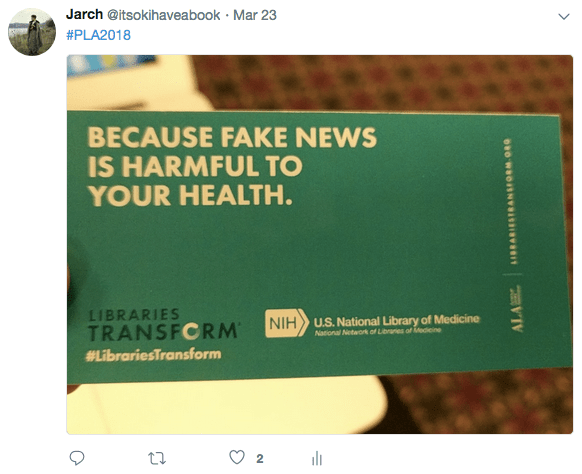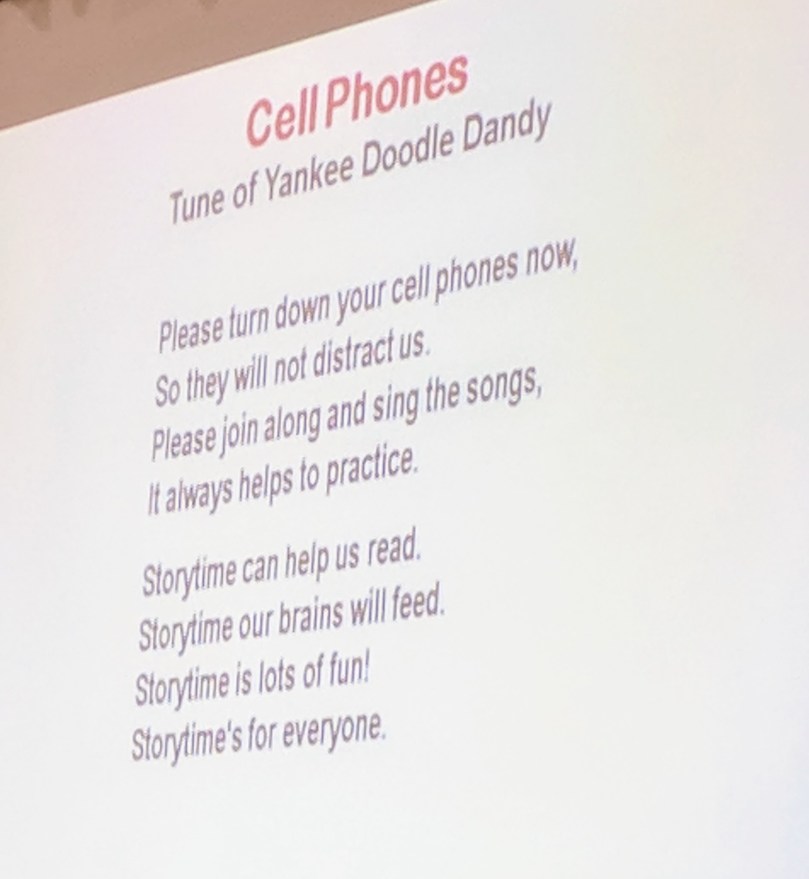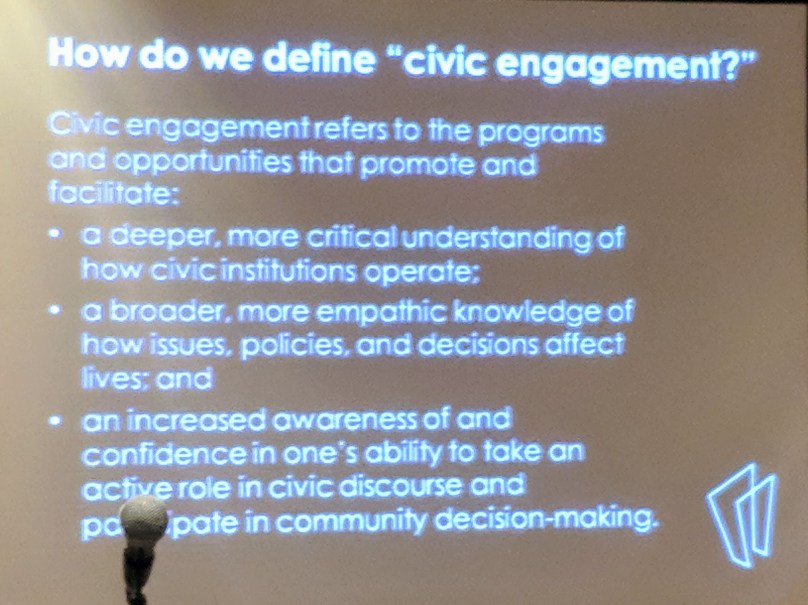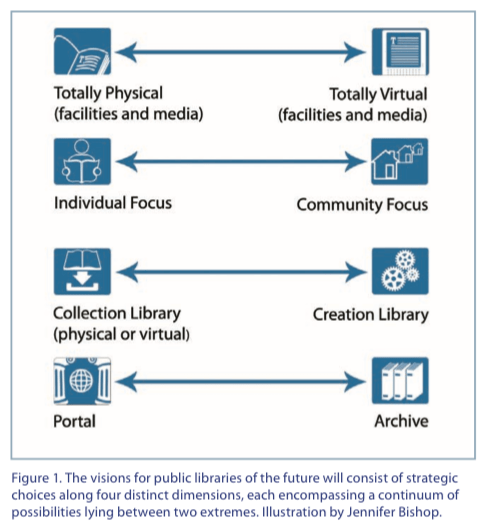
Tim Wu is a lawyer who clerked for a Supreme Court justice, worked at a Silicon Valley startup, then moved into academia; he’s now a professor at Columbia and a columnist for the New York Times. But if his name rings a bell for you, it’s probably because he coined the term “Net[work] Neutrality” in 2003.
The fundamental idea of Net Neutrality, said Wu, is that the user should decide what the internet is. The carrier (Internet Service Provider, or ISP) shouldn’t get in the way. ISPs should be “a medium in the true sense of the word medium, respecting the wishes of those on each side.” They should be “faithful agents” providing reliable service, not blocking, discriminating, or censoring.
The federal government adopted Net Neutrality as a rule under the Bush administration, but the Trump administration killed it (though it’s likely to return under the next administration). Why were they focused on that? “Free flows of information can be very threatening to those who wish to consolidate their power. The censorial instinct remains very strong.”
The next issue threatening our democracy, said Wu, is the “crisis of attention.” (His newest book is called The Attention Merchants: The Epic Scramble to Get Inside Our Heads.) “Our attention has become our scarcest and most valuable resource…[and] when you have a purely attention-based business model, the competition runs to the bottom. It’s not who can be the most accurate, it’s who can capture attention.”
As Cory Doctorow says, if you’re not paying for the product, you ARE the product. Wu put it differently, as he described an 1830s New York newspaper publisher’s idea to re-conceive the audience as a product to sell to advertisers. The advertising model, he said, is “the harvesting and resale of human attention.” And this is the “original sin” of nearly all of the Internet’s giants: they “embraced advertising as their only business model and tied themselves business to attention harvesting.” (Wikipedia, as a recent New York Magazine article pointed out, is an exception.) This, despite Google founders’ early recognition that “advertising-supported search engine will always be biased, always serving two masters (users and advertisers) and cannot be expected to produce reliable results.”
The dark consequences of this setup are clear, with new examples in the news every day (most recently, the Facebook/Cambridge Analytica scandal). Sites and platforms based on an advertising model are driven to capture people’s time and attention, and to learn more about them in order to offer targeted ads – or to manipulate them.

“We’re at a moment in our democracy…information flow has changed how this country is governed.” What can be done? What should be done? Wu asked. Whose responsibility is it, who are the trustees of our time? He argued, “The largest information intermediaries of our time…must start operating with a true sense of fiduciary public duty or face regulatory consequences….The goal of aiming for truth is something that the tech industry needs to learn right now. The time has come.”
For the final two programs of the day, I indulged my YA-loving side. First was “How to Adult: Teaching Life Skills to Teens” presented by Kayla Marie Figard of San Mateo County Libraries and Elizabeth “Biz” Tanner of the County of Los Angeles Public Library. Their “How to Adult” programs teach “life hacks,” i.e. necessary life skills like healthy cooking, public speaking, car maintenance, etiquette, time management, organization, stress management, mindfulness, finding a first apartment, money management, self-defense, first aid, laundry (and sewing and mending), and the list goes on!

The presenters provided many short activities (tongue twisters for public speaking; a “multitasking is a myth” task) and a very handy program planning worksheet (see below). Some of their workshops for teens were single events, while others were a series. Nearly all included food, a surefire way to boost attendance at any program. Librarians ran some workshops, while others were conducted by outside presenters. With some research, you can find willing partners, like county/city/town departments, credit unions, and local businesses; some presenters may come for free, others may charge a fee.
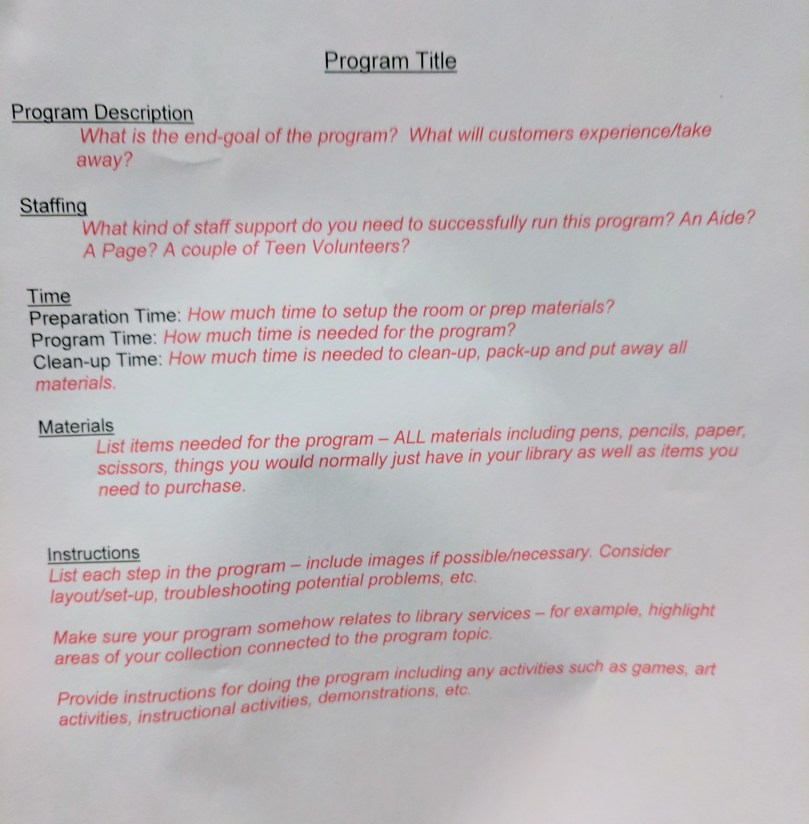
To decide on the topic(s), ask teens what they want to know! Think about your own young adult life – what did you wish you had known, and what surprised you? Talk to teachers at local high schools – they will know what school does(n’t) offer and where students’ knowledge gaps are.
Along with planning and running the programs, the presenters discussed evaluation and measuring outcomes – required for grant-funded programs, but good for every program. They suggested: (1) determine anticipated outcomes, (2) ask: do the programs teach teens something? Do they feel better prepared for adulthood? (3) conduct pre- and post-program surveys to assess growth.
This was an excellent program: the presenters were good speakers, and came prepared not just with their slides, but with copies of their worksheets, planning documents, examples and activities from their workshops. A+!
For the very last PLA program, I went to the YA Crossover, or “AAP Crossover Appeal: Books that Work for Teens and Adults.” Despite the program’s title, it didn’t really focus on the “crossover” aspect so much as the teen aspect, except in the sense that some of the audience had read some of the authors’ books as young adults, and still loved them.
Luanne Toth of School Library Journal moderated the panel of four authors: Ally Carter, Carolyn Mackler, Gayle Forman, and Ashley Woodfolk. Woodfolk is a debut author (The Beauty That Remains), and the other three are further into their careers. Mackler’s most recent book, The Universe is Expanding and So Am I, is a sequel to The Earth, My Butt, and Other Big, Round Things (a Printz honor book in 2004).

Here are a few quotes and paraphrases from the panel:
- “I write about young people but I don’t write young stories” -Gayle Forman
- “Young people are given license to feel your feelings.” There’s this idea that as you age you don’t feel things as strongly/intensely. You do have to moderate your feelings but you do have them. Satisfying as a writer and a reader. -Gayle Forman
- “A lot of what happens in high school shapes your adult life….And you don’t really get it until you get older.” YA writing is cathartic because it helps revisit and dissect what happened & what you felt. -Ashley Woodfolk
- “The world would be a lot better if we all read more broadly and more representatively.” -Ally Carter
- “Libraries are our outposts in every corner of the country” (some places don’t have bookstores or people can’t afford books) -Ally Carter
- “Encourage people to read everything…a kid might want to read something you won’t expect they want to read. Find out what a kid wants/needs” – Ashley Woodfolk
- “Every book is a mirror. No matter how different somebody is from you, there is still an emotional through-line.” -Gayle Forman
And that is a wrap! See all PLA 2018 posts here. I’m so glad I had the opportunity to go to this conference, and I think I made the most of it, attending a variety of sessions and programs. I do wish I had a Time-Turner and could have been to even more. If you were at PLA, or followed along via a great blog or Twitter thread, please share your favorite links!

